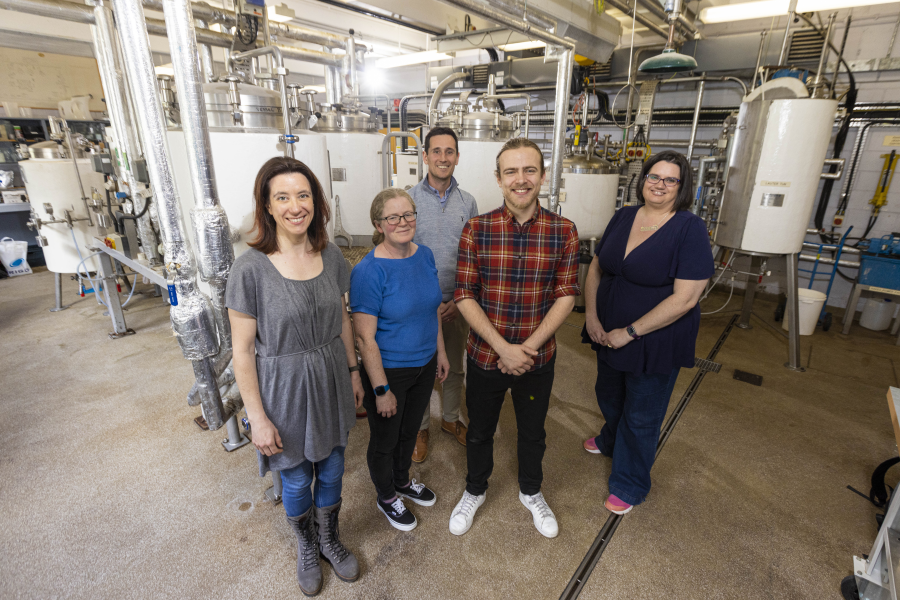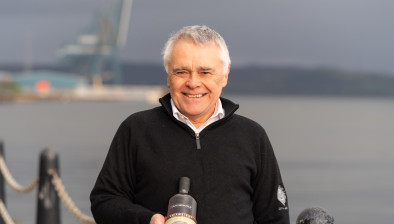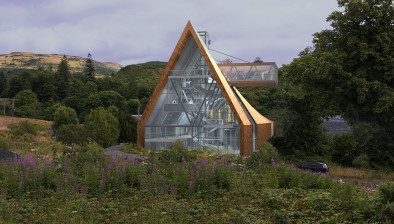Ardgowan Distillery to pilot novel CO2 capture technology

The Ardgowan Distillery has partnered with Heriot Watt University and engineering provider, Briggs of Burton, to develop pioneering technology to reduce its carbon impact – capturing all of the CO2 in its fermentation process and transforming it into green biomethane.
The technique, which has never been used in a Scotch whisky distillery before, will aim to capture the estimated 775,000kg of annual CO2 created through fermentation that will be produced by Ardgowan Distillery, near Inverkip - which is due to be operational by early 2024.
Through use of energy efficient technologies - including high temperature heat pumps to drive down energy use - Ardgowan Distillery aims to achieve carbon-neutral operation ahead of the Scotch Whisky Association’s 2030 deadline, with the intention of eventually becoming net negative for production CO2
Close to 500,000 tonnes of carbon dioxide (CO2) is produced by Scottish malt and grain distilleries and breweries every year. Whisky washbacks, used in distilleries as fermentation vessels, are generally fitted with CO2 extractors but this CO2 is rarely collected. The North British Distillery is one of the notable exceptions, producing CO2 for the beverage industry. However, the high costs and multiple challenges involved in using the existing technology makes it difficult for smaller companies to use.
Heriot-Watt’s expertise across engineering and distilled spirits will help explore a wider range of carbon reduction technologies for use by smaller distilleries. The project will overlap with MSc Brewing and Distilling projects at the University, which will extend the range of strategies explored and provide some facts for the industry on the various routes available to them, regardless of scale.
Areas of focus include identifying and assessing applications of recovered CO2 as well as CO2 generation and quality. It is known that volatiles, including ethanol, will also be stripped with CO2 during fermentation, especially at the higher temperatures used in distilleries. This project will explore whether recovering these volatiles is possible.
Dr Jessica Skelton from Ardgowan Distillery Company Ltd, said: “The major industry players have the scale and resources to achieve their sustainability objectives. However, this research is so vital because it will provide practical guidance and technologies at a scale that’s within the reach of the many independent companies looking to capture and reuse biogenic CO2. It could also support companies in other markets. Whisky producers in Canada, USA and Japan often look to the Scotch whisky industry as leaders in production and operational change.
“Many manufacturing environmental assessments overlook biogenic CO2. As a result, these reports fail to consider the by-product’s potential. Our goal is to assess the production, capture, and potential uses of CO2 produced at our new 1 million litre per annum Scotch malt whisky distillery, finding new, sustainable uses that can be applied here and at other Scottish and international distilleries.”
Dr Dawn Maskell, head of the International Centre for Brewing and Distilling (ICBD) at Heriot-Watt University, commented: “This project provides both leadership and practical solutions for distillers, brewers, and other beverage manufacturers as they strive to address their net zero challenges. Through this research, we’ll be creating suitable technologies for the wider industry, especially those that operate on a smaller scale. Current systems can be less economical and challenging to implement and we look forward to changing that.”
Scott Bradley, head of business development and partnerships at Heriot-Watt University, said: “Research into biogenic CO2 allows new applications to be explored from an academic perspective, guided by end-users Ardgowan Distillery, in partnership with technology provider Briggs of Burton. Our business development team is experienced at facilitating partnerships of this type, matching the right expertise to an industry challenge, and presenting solutions that drive economic and environmental benefits with potential for global impact.”
The project will be based at the International Centre for Brewing and Distilling at Heriot-Watt University’s Edinburgh campus. The ICBD has access to its own pilot brewing, fermentation, and distillation facilities with labs for all aspects of brewing and distilling research including analytical capabilities.
The research is funded through the Food and Drink Net Zero Challenge fund, which was set up by Interface and the Scotland Food and Drink Partnership to support Scotland’s food and drink businesses as part of the Recovery Plan funded by the Scottish Government.









